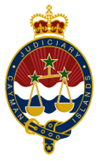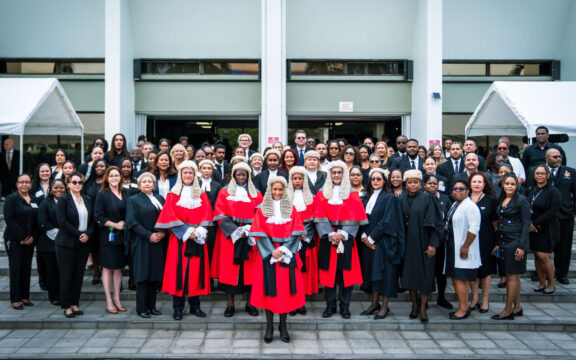
Applying for Legal Aid
Applying for Legal Aid (Criminal and Civil)
The Legal Aid Act gives authority for Courts to grant free or subsidised legal aid in criminal and civil matters. | Learn More
Contacting Legal Aid
Legal Aid Officer
(Tel:) 345-244-3829, 345-244-3889, 345-244-3742 or 345-244-3761
(Email): legalaid@judicial.ky
Filing a Legal Claim
Bailiff Services
A Bailiff is appointed under the Grand Court Act and the duties are outlined in the Judicature Act. | Learn More
Small Claims
Where a claim is so small as not to justify engaging an attorney, claimants are encouraged to act for themselves. | Learn More
Finding a Lawyer, JP or Notary Public
Justices of the Peace
List of Justices of the Peace in the Cayman Islands. | View List
Law Firms and Recognised Bodies
List of Law Firms and Recognised Bodies Licensed to Operate in the Cayman Islands. | View List
Licensed Attorneys
A list of Attorneys licensed to practice in the Cayman Islands. | View List
Notaries Public
List of Notaries Public licensed in the Cayman Islands. | View List
Going to Court
Assistance at the Courts
Claimants who need assistance for the filing of small claims should attend at the Court Civil Registry (Kirk House, 3rd Floor) and ask to speak to a Civil Clerk. | Learn More
Being a Juror
Information for prospective jurors. | Learn More
Being a Witness
Information to help you cope with giving evidence. | Learn More
Being an Observer
Most court cases are public events. You are able to walk in without invitation, sit down, and watch as much as you want. | Learn More
Being a Litigant
Any person who is a party to a lawsuit is called a litigant. | Learn More
Paying Court Fees and Fines
Paying Court Fees
In addition to court fees, the Law Courts also collect notary public fees, legal practitioners fees, law firm operational fees, legal aid contributions, fees for subscription to reported and unreported judgments, and other miscellaneous fees. Payment can be made by visiting the Cash Office, by ACH payment or through Payment Portal.| Learn More
Paying Traffic Tickets
A traffic ticket serves as a summons to appear in court in connection with the offence, however, as noted on the ticket, there is the alternative procedure of paying the fine. Fines must be paid at the Cash Office (Law Courts Kirk House) on or before 9:45 AM on the date designated on ticket. | Learn More
Probate and Administration
What is Probate and Administration?
When a person dies and leaves an estate somebody has to deal with his or her estate (this includes money, property and other possessions) by collecting in all the estate, paying any debts and distributing the estate to those persons entitled to it. | Learn More
Resealing of Foreign Grants
Applications can be made by persons who have obtained a grant of representation from foreign courts in respect of the estates of persons who died domiciled outside the Cayman Islands leaving assets or property within the Islands. | Learn More
Location of Probate Registry
The Probate Registry is located at the Law Courts Building – Kirk House.
Primary Sources (Laws)
Primary sources for probate and administration include the following:
- Cayman Islands
- England
- Form PA2 of the English Rules and Forms (Printed by Satellite Press, Limited
- Tristram and Coote Probate Practice, Butterworth, London Dublin & Edingburgh, 1996
Satisfying a Judgment Debt
Satisfying a Judgment Debt
Having secured a judgment by the court with regard to a debt, a creditor may seek the Court’s assistance in cases where a debtor is unable or refuses to pay the debt.
In such instances, the Court may make a number of orders. These include seizure of property, an examination of the debtor by the court to determine resources of the debtor, an attachment of earnings, or “garnishee” proceedings in which money owed to the debtor by a third party can be obtained for repayment of debts.
A judgment creditor has a number of options available to satisfy a judgment debt, including:
- Seizing the property of the judgment debtor – property of the judgment debtor may be seized by a court bailiff pursuant to a writ of execution
- Examination of judgment debtor – the judgment debtor can be brought before the court to be examined on oath regarding his property or other means of satisfying the judgment
- Attachment of earnings – the judgment debtor’s wages or other income can be attached
- Garnishee proceedings – if the judgment debtor is owed money by a third party, that money can be obtained to satisfy the judgment
Submitting a Complaint or FOI Request
Customer Complaint Procedure
The Law Courts strive to meet the needs of our customers, but we recognize that there maybe some occasions when the actions or comments of staff will not meet your expectations. Our Complaints Policy was formulated to allow us an opportunity to ensure the expectations of our customers are met. | Learn More
Freedom of Information Policy and Procedure
As a public authority, the Law Courts are committed to openness, transparency and serving the public interest in compliance with the Freedom of Information Act. | Learn More







